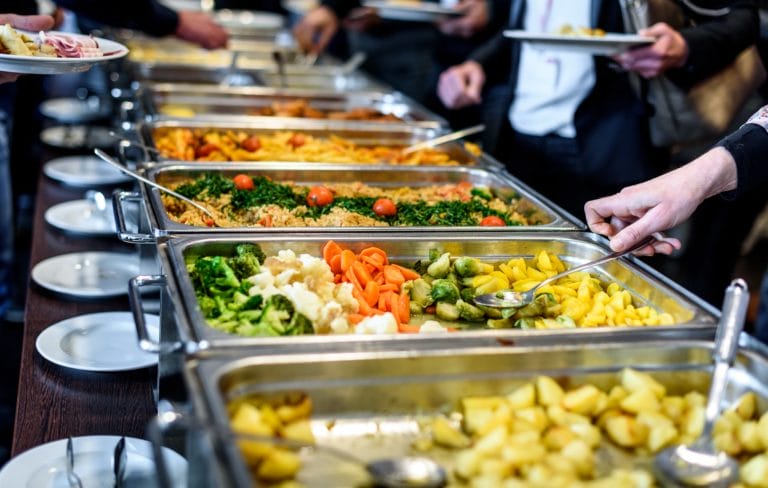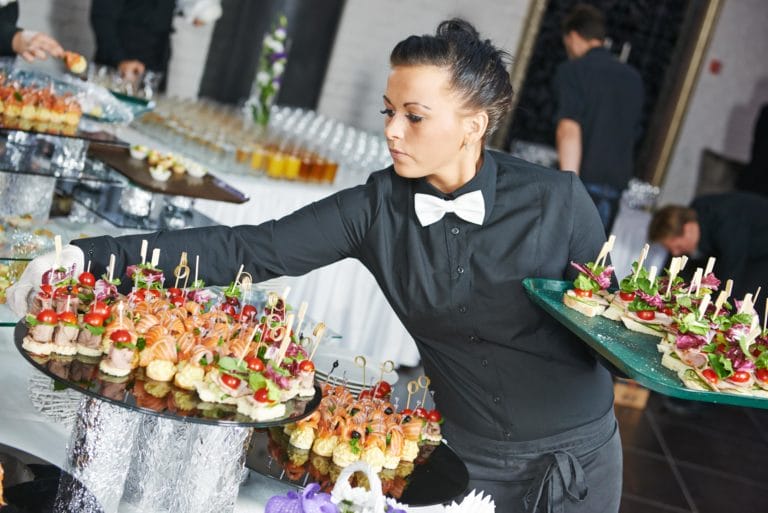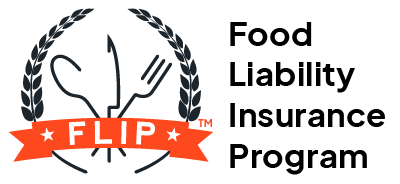Last Updated: July 10, 2024
Operating a catering business can be extremely fulfilling and profitable. But, like any business, you face a number of risks that could lead to expensive accidents.
Whether you’re just starting your catering business or have been in the industry for years, identifying potential risks can help you prevent them from ever occurring.
The real-world catering claims examples below illustrate the importance of conducting thorough risk assessments and taking measures to protect your catering business.
4 Catering Claims Examples
To give you a better idea of what accidents could occur while running your catering business, below are four real claims from FLIP catering insurance policyholders.
Catering Claim Example #1: Food Poisoning
After eating food catered by the insured, the claimant contracted salmonella food poisoning. This illness developed into colitis, resulting in sky-high medical bills and lost wages for the claimant. They filed a third-party claim with us to pay for these damages.
Claim Amount: $71,570
Covered by FLIP: ✅
Catering Claim Example #2: Property Damage
The insured was setting up their catering equipment at a private residence for an event they were hired to work. As they pushed their catering equipment on a cart down the driveway, they lost control of the cart and struck one of the parked cars.
The owner of the car filed a third-party claim with us to repair the scratched paint on their car.
Claim Amount: $3,100
Covered by FLIP: ✅
Catering Claim Example #3: Equipment Damage
A storm rolled through the insured’s town and caused major flooding. A lot of the insured’s catering equipment suffered water damage due to the floods and they had to replace thousands of dollars worth of gear.
Claim Amount: $11,287
Covered by FLIP: ✅
Catering Claim Example #4: Property Damage
The insured filed a claim on behalf of a client who had hired them to cater a private event at their house. In order to keep food at a safe temperature, the insured placed a heating device on the client’s table. Unfortunately, the heat from the device damaged the table, requiring over a thousand dollars to repair.
Claim Amount: $1,019
Covered by FLIP: ✅

Common Catering Liability Risks
There are risks associated with running any food business, and catering is no exception.
The most common risks catering businesses face include:
- A client getting injured or sick because of your operations
- Accidentally damaging a venue or your client’s property while catering an event
- Falling victim to a data breach or other cyber attack
- Your cooking/catering equipment malfunctioning
- Your cooking/catering equipment being stolen
- One of your employees getting injured on the job
How to Conduct a Catering Risk Assessment
While it isn’t possible to prevent all accidents from happening, you can prevent a lot of them with good risk management techniques — saving you serious dough in the long run.
Follow these steps for managing risks as a catering business:
- Identify hazards: This includes everything from physical hazards like sharp objects and potential slip-and-fall incidents to human error.
- Determine who is at risk of being harmed and how: Think of common ways the venue or your customers could be harmed by your operations.
- Evaluate the risks and decide on precautions: Consider ways you could prevent each of them, such as training, equipment maintenance, and safe food handling procedures.
- Record your findings and implement them: Keep a record of identified hazards with a risk assessment checklist. Train your staff to make sure they know how to prevent these incidents from occurring.
- Review and update your risk assessment checklist: Conduct periodic reviews with a risk assessment checklist, especially after you get new equipment or an accident occurs.
Download our free mobile catering risk assessment checklist and start taking preventative measures today!
By following these steps and using our risk assessment checklist, you can prevent expensive accidents and keep your employees, customers, and business safer.
Pro Tips
- Involve your staff in risk assessment procedures. They may have insights into potential hazards that you aren’t aware of.
- Stay on top of the legal requirements for catering businesses in your area.
- Seek advice from health and safety professionals to make sure your risk management strategies are up-to-date and effective.
Catering Guidelines to Protect Your Business
To make sure your business is sufficiently shielded against costly claims, follow these three guidelines.
1. Follow Food Handling and Hygiene Best Practices
When you and your employees are properly trained in food safety techniques, you’re better equipped to prevent food poisoning and allergen cross-contamination.
Courses like ServSafe and Food Handler Solutions provide thorough instruction and require a passing score on an exam in order to receive a food handler card. Check with your state or county’s health department as well, because they may have their own food safety course that you could be legally required to take.
2. Prioritize Health and Safety
In addition to keeping your food safe to eat, it’s critical that your workplace is safe for you, your employees, and your clients:
- Keep high-traffic areas clear of clutter and trip hazards
- Train employees in proper ergonomics to avoid injuries
- Train staff in proper use of equipment
- Maintain your equipment regularly
This can be a challenge for caterers because your workplace, and sometimes even your staff, is constantly changing depending on what event you’re working. But by prioritizing safety, you can avoid a lot of preventable, expensive claims.
3. Purchase Catering Liability Insurance
If an accident does occur, insurance is there to shield you from the financial impact of a claim. Having insurance means you get financial support for the claims you’re most likely to face as a caterer, meaning you can keep your business running despite mishaps.
Cost and coverage are important things to look at when considering catering insurance. With FLIP, you can get highly rated catering liability insurance starting at just $25.92 a month, which includes the following types of coverage:
With FLIP, you can customize your policy with add-on coverages like cyber liability to shield you against data breaches or tools and equipment to insure your catering gear. You can even add workers’ compensation insurance to your FLIP policy in case one of your employees gets hurt on the job.
The best part? You can get your policy online in 10 minutes or less! Simply fill out an application, get your free quote, and finish checking out to get your Certificate of Insurance (COI) from FLIP.

Frequently Asked Questions
What Are Effective Solutions for Managing Dietary Restrictions and Food Allergies?
When planning menus, include options for people with common dietary restrictions, such as gluten-free, nut-free, or vegetarian dishes. Clearly label all items with any allergens or ingredients like meat, dairy, or eggs, and follow food handling best practices to avoid cross-contamination.
How Can Caterers Ensure Food Quality and Safety During Transport?
If you’re transporting food to a venue, make sure it’s properly packaged and temperature-controlled according to food safety standards. Train your staff to know what temperature different types of food need to be held at to prevent harmful bacteria growth.
How Can Caterers Deal With Equipment Failure During an Event?
Equipment failure can ruin a gig, which is why it’s important to bring backups with you whenever possible. Pack extra chafing dishes and beverage dispensers in case one of them breaks.
Make sure your cooking and food storage equipment is regularly serviced to prevent any broken ovens the morning of a big event. Or, if you rent a commercial kitchen, verify that they regularly service their equipment and gear too.

By Alex Hastings
Alex is a Marketing Copywriter at Food Liability Insurance Program (FLIP). In her free time, she enjoys reading, birding, traveling, and finding any excuse to get brunch.

